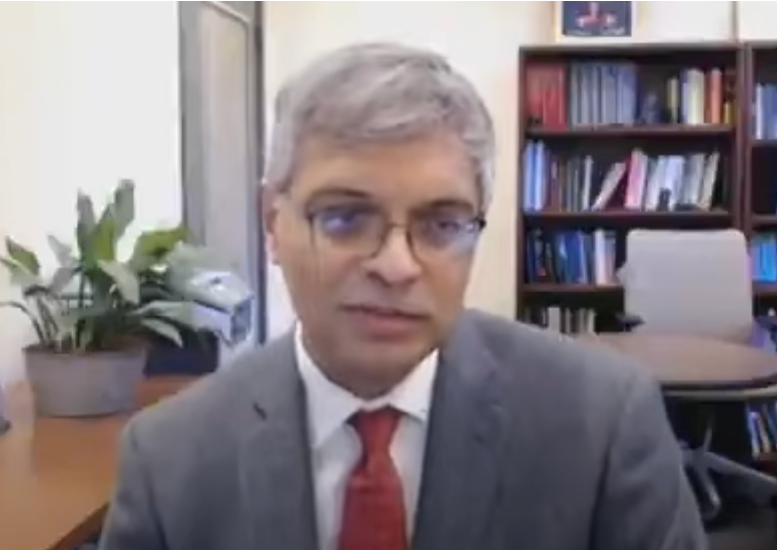Breaking News
Trump Taps Pandemic Skeptic Dr. Jay Bhattacharya as NIH Director

Source: YouTube
President-elect Donald Trump has nominated Dr. Jay Bhattacharya, a Stanford physician and economist, as the next director of the National Institutes of Health (NIH). Known for his controversial stances on COVID-19 policies, including opposition to lockdowns and skepticism about vaccines, Bhattacharya’s nomination signals a dramatic shift in how the NIH will approach public health and medical research.
Bhattacharya’s tenure, if confirmed, will oversee a $48 billion budget and 27 research institutes. Trump praised Bhattacharya for his advocacy of “focused protection” policies during the pandemic and his commitment to reforming the NIH. However, his nomination has ignited debate, with supporters lauding his bold ideas and critics raising concerns about his public health positions.
Dr. Jay Bhattacharya’s Pandemic Legacy
Dr. Bhattacharya rose to prominence as one of the authors of the Great Barrington Declaration, a 2020 manifesto that argued against broad lockdowns during the COVID-19 pandemic. The declaration proposed allowing the virus to spread among young, healthy individuals to build natural immunity while protecting vulnerable populations. While supported by many conservatives, it was condemned by public health experts who labeled it dangerous and dismissive of the broader risks of the virus.
The backlash was immediate and intense. Former NIH Director Dr. Francis Collins referred to Bhattacharya and his co-authors as “fringe epidemiologists,” and many accused them of promoting policies that could lead to unnecessary deaths. Bhattacharya has since defended his positions, arguing that lockdowns caused significant economic and mental health harm, a perspective now gaining broader attention as the long-term impacts of pandemic policies become clearer.
Jay Bhattacharya and Donald Trump: A Shared Vision
Bhattacharya’s ties to Trump date back to his first term, when he collaborated with Trump’s pandemic advisors. His critiques of Dr. Anthony Fauci and the federal COVID-19 response resonated with Trump’s administration, earning him a reputation as a dissenter against mainstream public health orthodoxy.
Trump has described Bhattacharya as someone who will restore the NIH to its “Gold Standard” by prioritizing innovation and addressing chronic illnesses. Alongside Robert F. Kennedy Jr., Trump’s nominee for Health and Human Services Secretary, Bhattacharya is expected to challenge long-standing public health policies and shake up the nation’s biomedical establishment.
Critics, however, warn that Bhattacharya’s approach could marginalize evidence-based decision-making in favor of ideological perspectives. His skepticism about vaccine mandates and his opposition to mask mandates in schools have fueled fears that his leadership could undermine trust in the NIH.
Reactions to Jay Bhattacharya’s Nomination
The nomination has drawn mixed reactions. Supporters argue that Bhattacharya’s willingness to question conventional wisdom makes him an ideal reformer for an agency they view as overly bureaucratic. They believe his focus on innovative research and reducing civil servant influence will benefit American healthcare.
On the other hand, public health experts and former NIH officials have expressed alarm. Critics highlight Bhattacharya’s past underestimations of COVID-19’s lethality—he once predicted the death toll would not exceed 40,000, while over a million Americans ultimately died. They also point to his testimony in lawsuits challenging COVID-19 policies, which judges dismissed as advancing a personal agenda rather than credible science.
Amid these divisions, Bhattacharya’s nomination underscores the broader debate over how public health policies should balance individual freedoms with collective safety.
What’s Next for the NIH?
If confirmed, Bhattacharya will likely prioritize reforms aimed at decentralizing the NIH’s power and refocusing its research agenda. He has called for reducing the influence of career civil servants, whom he accuses of stifling dissenting opinions during the pandemic. His leadership may steer the NIH toward funding more unconventional research and revisiting the agency’s pandemic response strategies.
However, Bhattacharya’s controversial reputation could complicate his ability to build consensus within the NIH and among lawmakers. With a Republican-majority Senate expected in January, his confirmation is likely, but it will face scrutiny over how his policies align with the NIH’s mission to promote scientific discovery and improve public health.
Visionary or Skeptic? We’ll Soon Find Out
Jay Bhattacharya’s nomination as NIH director reflects a broader shift in Trump’s health policies, emphasizing reform and challenging established norms. While his supporters see him as a visionary poised to address America’s pressing health challenges, critics worry his leadership could politicize science and undermine public trust in the NIH.
Do you believe Dr. Jay Bhattacharya is the right choice to lead the NIH? Tell us what you think!
